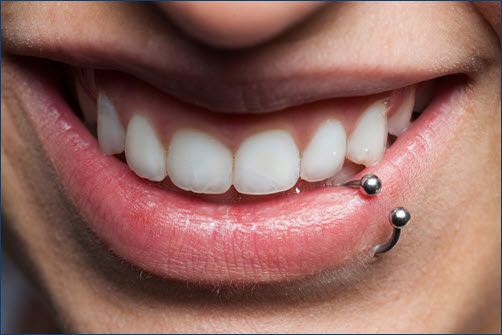The Dental Risks of Tongue and Lip Piercings
Body piercings are a popular form of self-expression, with tongue and lip piercings being particularly trendy. While these piercings can be visually striking, they come with a range of dental risks that should be carefully considered. Understanding these risks can help individuals make informed decisions and take steps to protect their oral health if they choose to get a piercing.
Potential Dental Risks
Tooth Damage
One of the most common dental risks associated with tongue and lip piercings is tooth damage. Metal jewelry can chip or crack teeth, especially if you accidentally bite down on it. Over time, even gentle contact between the jewelry and teeth can wear down the enamel, leading to increased sensitivity and decay.
Gum Recession
Constant contact between piercings and gums can cause gum recession. This occurs when the gum tissue wears away, exposing the roots of the teeth and increasing the risk of decay and sensitivity. Gum recession can also lead to periodontal disease, which can have long-term effects on oral health.
 Infections
Infections
The mouth is full of bacteria, making it a prime location for infections, especially after a piercing. Infections can lead to swelling, pain, and even systemic health issues if bacteria enter the bloodstream. Proper aftercare and oral hygiene are crucial to minimizing the risk of infection, but the possibility always exists.
Nerve Damage
Nerve damage is a potential risk during the piercing process, especially with tongue piercings. This can lead to temporary or permanent loss of sensation in the tongue, affecting taste, movement, and speech.
Difficulty in Eating and Speaking
Tongue and lip piercings can interfere with eating and speaking. Initially, the piercing may cause swelling and discomfort, making it challenging to chew food or speak clearly. Over time, the presence of jewelry can continue to impact speech and oral function.
Allergic Reactions
Some individuals may experience allergic reactions to the metals used in piercing jewelry. Nickel, a common component in many metal alloys, can cause redness, itching, and swelling in susceptible individuals.
Precautions and Care
For those who choose to get a tongue or lip piercing, certain precautions can help minimize dental risks:
Choose the Right Jewelry
Opt for jewelry made from high-quality, hypoallergenic materials such as surgical stainless steel, titanium, or gold to reduce the risk of allergic reactions and minimize damage to teeth and gums.
Practice Good Oral Hygiene
Maintain excellent oral hygiene by brushing and flossing regularly to reduce the risk of infection. Rinse your mouth with an antiseptic mouthwash after meals to keep the piercing site clean.
Regular Dental Checkups
Visit your dentist regularly for checkups and cleanings. Inform your dentist about your piercing so they can monitor any potential issues and provide tailored advice.
Avoid Playing with Jewelry
Avoid clicking the jewelry against your teeth or playing with it in your mouth, as this can increase the risk of tooth damage and gum recession.
Monitor for Signs of Infection
Watch for signs of infection such as swelling, redness, discharge, or persistent pain. Seek medical attention promptly if you suspect an infection.
While tongue and lip piercings can be a unique form of self-expression, they come with several dental risks that should not be overlooked. By understanding these risks and taking appropriate precautions, individuals can make informed decisions about their piercings and protect their oral health. Regular dental checkups, good oral hygiene, and careful selection of jewelry are essential to minimizing the potential negative effects of oral piercings. If you’re considering a tongue or lip piercing, consult with your dentist for personalized advice and guidance.



